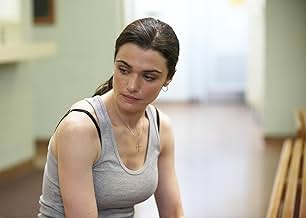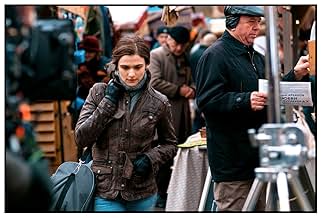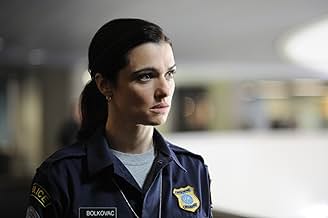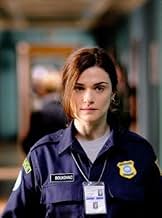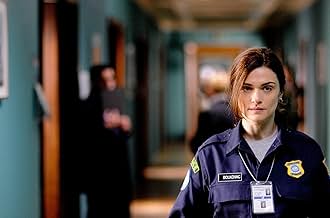A drama based on the experiences of Kathryn Bolkovac, a Nebraska cop who served as a peacekeeper in post-war Bosnia and outed the U.N. for covering up a sex trafficking scandal.A drama based on the experiences of Kathryn Bolkovac, a Nebraska cop who served as a peacekeeper in post-war Bosnia and outed the U.N. for covering up a sex trafficking scandal.A drama based on the experiences of Kathryn Bolkovac, a Nebraska cop who served as a peacekeeper in post-war Bosnia and outed the U.N. for covering up a sex trafficking scandal.
- Director
- Writers
- Stars
- Awards
- 8 wins & 10 nominations total
- Zoe
- (as Anna Anissimova)
- Director
- Writers
- All cast & crew
- Production, box office & more at IMDbPro
Featured reviews
The times are tough and the residues of communal hatred still linger - one situation shows the apathy of the local policemen towards a victim of domestic-abuse given that she is from the "other side". Weisz stumbles upon a racket of human trafficking that lures young girls into slavery who are abused by ruthless sadists -- all with the active connivance and involvement of some employees of the firm. Wiesz lone voice is silenced by the firm -- despite the support she receives from a plucky UN officer for gender-affairs, played by Vanessa Redgrave.
Eventually, Rachel takes the sordid story, of protectors who have turned predators, to the media in the UK, where the firm is registered.
Fighting workplace conspiracy that is fueled by apathy and greed can be lonesome and Wiesz portrayal of a gritty professional is engrossing. One is reminded of the roles of Julia Roberts in Erin Brokovich (2000) and Laura Dern in Damaged Care (TV 2002), standing up for what is right despite being stymied by the perpetrators whose acts have the undertones of gender-bias, and suffering the indignation while staying the course with deep conviction.
The movie is spartan in production-value, driving home the truth that a good script and great performances are more than enough to tell a story.
The story makes one wonder of the risks that arise out of the involvement of private enterprises in security and policing, notwithstanding the mandates under which they operate.
For six months of her time and $100,000, Kathryn was to monitor the local Sarajevo police and advise them on proper police procedures. Very quickly, she discovers the word monitor means turn a blind eye as Serbs, Croats, and Bosniaks abuse whatever power they have to continue a sort of undeclared war on each other. The Serb policemen will not investigate or prosecute domestic violence cases, especially if the woman is Muslim. Kathryn successfully leads Bosnia's first case against domestic violence earning her a more visible job as the department head for gender affairs.
Now her scope includes far more than standard local police issues. Young Eastern European and Russian girls are turning up on the streets and shelters looking severely assaulted and sexually abused. To her shock and dismay, Kathryn learns that United Nations employees from all nations are not only the girls' customers, but frequently aid local human traffickers in their transport and have an interest in holding the girls against their will.
Nobody in any position of authority ever raises their hand for a scandal, so all of Kathryn's investigations and findings are swept under the rug and she is ostracized from the rest of her compatriots who are either not interested in obtaining justice for the girls or believe so much in bureaucracy and paperwork that they sometimes send the girls right back to their rapists. On Kathryn's side is the High Commissioner for Human Rights rep played by Vanessa Redgrave and an internal affairs agent played by David Strathairn.
Frequently, the subject matter and scenes of girls undergoing sexual abuse and torture are stomach churning. The film can be relentless at times showing various punishments and cruelty. Human trafficking, especially if it involves a trusted world organization and its sleazy contractors, is an extremely important subject to cover and make films about; therefore, be ready to adjust uncomfortably in your seats as you watch downright disgusting and brutal activities perpetrated against teenage girls.
The Whistleblower deserves applause for bringing to light the company Democra which still carries out government contracts to this day. However, when the film takes a break for showing the girls' plight, it focuses on Kathryn's personal life and back story which are choppy and do not come across as fully thought out. There is her home life back in the states which she left, including her daughter, and an awkward budding romance with a Dutch security contractor. Including romance and relationships in a film with this disturbing subject matter would be tough for any director, and this first time feature director does not quite pull it off.
It will take this reviewer some time to get over some of the images in The Whistleblower; tread at your own risk. But this story deserves to be told and shown in all of its brutality.
Rachel Weisz delivers what is far and away her best performance yet. She captures the emotional complexity and strength that Ms. Bolkovac displayed. Some have stated she was conflicted, but I never saw that. I saw the character of a woman who had a clear understanding of right and wrong ... and would settle for nothing less than "right".
Kathryn, a Nebraska cop, accepts a UN peacekeeping job in post-war Bosnia. Her spirit and strength is recognized, and rewarded with promotion, by Madeleine Rees (Vanessa Redgrave) who is director of the Human Rights Commission. It is in this job where she slowly uncovers the corruption and cover-up of sex trafficking of underage girls. Even more sickening is that this most profitable business is being run by the peacekeepers and law officers being paid to protect these citizens.
It turns out that though Ms. Bolkovac was fighting for these human rights of these girls, she was also working diligently to expose the corruption of the private contractors hired to supply personnel in all aspects of recovery in countries such as Bosnia. In her situation, the private contractor was DynCorp and she had no problem pulling back the curtain on the lack of training and control exhibited by this and other contractors.
Combine that with the frustrations in dealing with bureaucrats such as Monica Bellucci's character, it often feels as if Ms. Bolkovac is fighting a one woman crusade (with a little help from David Strathairn's character). When red tape (such as no passport for the abused girls) and diplomatic immunity become major players in fending off her efforts, we get the wonderful line "immunity not impunity". That explains a great deal.
The film is directed by first timer Larysa Kondracki. Setting and tone is well captured, but the editing of many scenes left me somewhat distracted, but not to the point of annoyance. There is so much tension and exposure to despicable actions in this film that I found it difficult to relax afterward. The strength and courage of this woman will restore your faith in humanity and remind us we should never turn away from doing the right thing.
The idealistic Kathryn believes that she can make the difference in a country devastated by the war, and she works hard and is promoted to director of her department. But soon she discloses a corruption and human trafficking ring with the direct participation of contractors and diplomats that have diplomatic immunity and she does not know who is reliable.
"The Whistleblower" is a powerful, gripping and heartbreaking movie about corruption and human trafficking in a country devastated by the war. There are great movies about human trafficking and "The Whistleblower" has a plus since it is based on true events.
Rachel Weisz has a top-notch performance in the role of the brave Kathryn Bolkovac, whose story can be easily found in Internet. Ms. Vanessa Redgrave and the always efficient David Strathairn lead the magnificent supporting cast. My vote is nine.
Title (Brazil): "A Informante" ("The Whistleblower")
The really ugly scenes are when we see what is done to the trafficked girls. It almost seems as though the movie should have focused more on them. But what is equally important to understand is not only the atrocities committed with impunity by private contractors, but the risk that whistleblowers face even today (as shown by the WikiLeaks case).
Either way, this is something that everyone should see to understand the reality behind modern-day mercenary armies.
Did you know
- TriviaKathryn Bolkovac, the woman on whose real life experiences the film is based, sold the rights to her story to director Larysa Kondracki for $100.
- GoofsWhen Kathryn is asked to return her ID at the HQ, her right-side shirt collar is unfolded. When she is escorted, the collar is folded again, and in the next shot it is the left-side collar that is unfolded.
- Quotes
Kathryn Bolkovac: [email to authorities] We are peacekeepers who came to protect the innocent, but now prey upon them in the worst ways possible. We may be accused of thinking with our hearts instead of our heads, but we will have our humanity.
- ConnectionsFeatured in Maltin on Movies: Man on a Ledge (2012)
- SoundtracksVONHA (War)
Written by Anatoli Krupnov (as Anatoly Krupnov), Vasily Bilishotsky and Vladimir Ermakov
Performed by Black Obelisk
Courtesy of CD-Maximum
Details
- Release date
- Countries of origin
- Languages
- Also known as
- The Whistleblower
- Filming locations
- Production companies
- See more company credits at IMDbPro
Box office
- Gross US & Canada
- $1,124,966
- Opening weekend US & Canada
- $61,002
- Aug 7, 2011
- Gross worldwide
- $1,870,392
- Runtime1 hour 52 minutes
- Color
- Sound mix
- Aspect ratio
- 2.35 : 1
Contribute to this page




